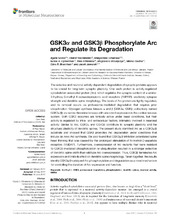| dc.contributor.author | Gozdz, Agata | en_US |
| dc.contributor.author | Nikolaienko, Oleksii | en_US |
| dc.contributor.author | Urbanska, Malgorzata | en_US |
| dc.contributor.author | Cymerman, Iwona | en_US |
| dc.contributor.author | Sitkiewicz, Ewa | en_US |
| dc.contributor.author | Blazejczyk, Magdalena | en_US |
| dc.contributor.author | Dadlez, Michal | en_US |
| dc.contributor.author | Bramham, Clive R. | en_US |
| dc.contributor.author | Jaworski, Jacek | en_US |
| dc.date.accessioned | 2018-02-09T13:06:32Z | |
| dc.date.available | 2018-02-09T13:06:32Z | |
| dc.date.issued | 2017-06-16 | |
| dc.Published | Gozdz, Nikolaienko O, Urbanska, Cymerman, Sitkiewicz, Blazejczyk, Dadlez M, Bramham CRE, Jaworski. GSK3α and GSK3β Phosphorylate Arc and Regulate its Degradation. Frontiers in Molecular Neuroscience. 2017;10:192 | eng |
| dc.identifier.issn | 1662-5099 | |
| dc.identifier.uri | https://hdl.handle.net/1956/17376 | |
| dc.description.abstract | The selective and neuronal activity-dependent degradation of synaptic proteins appears to be crucial for long-term synaptic plasticity. One such protein is activity-regulated cytoskeleton-associated protein (Arc), which regulates the synaptic content of α-amino-3-hydroxy-5-methyl-4-isoxazolepropionic acid receptors (AMPAR), excitatory synapse strength and dendritic spine morphology. The levels of Arc protein are tightly regulated, and its removal occurs via proteasome-mediated degradation that requires prior ubiquitination. Glycogen synthase kinases α and β (GSK3α, GSKβ; collectively named GSK3α/β) are serine-threonine kinases with abundant expression in the central nervous system. Both GSK3 isozymes are tonically active under basal conditions, but their activity is regulated by intra- and extracellular factors, intimately involved in neuronal activity. Similar to Arc, GSK3α and GSK3β contribute to synaptic plasticity and the structural plasticity of dendritic spines. The present study identified Arc as a GSK3α/β substrate and showed that GSKβ promotes Arc degradation under conditions that induce de novo Arc synthesis. We also found that GSK3α/β inhibition potentiated spine head thinning that was caused by the prolonged stimulation of N-methyl-D-aspartate receptors (NMDAR). Furthermore, overexpression of Arc mutants that were resistant to GSK3β-mediated phosphorylation or ubiquitination resulted in a stronger reduction of dendritic spine width than wildtype Arc overexpression. Thus, GSK3β terminates Arc expression and limits its effect on dendritic spine morphology. Taken together, the results identify GSK3α/β-catalyzed Arc phosphorylation and degradation as a novel mechanism for controlling the duration of Arc expression and function. | en_US |
| dc.language.iso | eng | eng |
| dc.publisher | Frontiers | eng |
| dc.rights | Attribution CC BY | eng |
| dc.rights.uri | http://creativecommons.org/licenses/by/4.0 | eng |
| dc.subject | Arc/Arg3.1 | eng |
| dc.subject | GSK3 | eng |
| dc.subject | proteasomal degradation | eng |
| dc.subject | phosphorylation | eng |
| dc.subject | dendritic spines | eng |
| dc.subject | neuronal activity | eng |
| dc.subject | NMDA | eng |
| dc.title | GSK3α and GSK3β Phosphorylate Arc and Regulate its Degradation | en_US |
| dc.type | Peer reviewed | |
| dc.type | Journal article | |
| dc.date.updated | 2018-01-03T09:02:03Z | |
| dc.description.version | publishedVersion | en_US |
| dc.rights.holder | Copyright 2017 The Author(s) | |
| dc.identifier.doi | https://doi.org/10.3389/fnmol.2017.00192 | |
| dc.identifier.cristin | 1491643 | |
| dc.source.journal | Frontiers in Molecular Neuroscience | |
| dc.subject.nsi | VDP::Medisinske fag: 700::Basale medisinske, odontologiske og veterinærmedisinske fag: 710 | |
| dc.subject.nsi | VDP::Midical sciences: 700::Basic medical, dental and veterinary sciences: 710 | |

